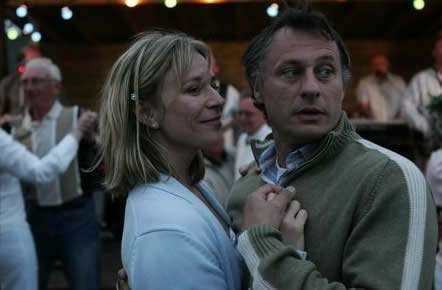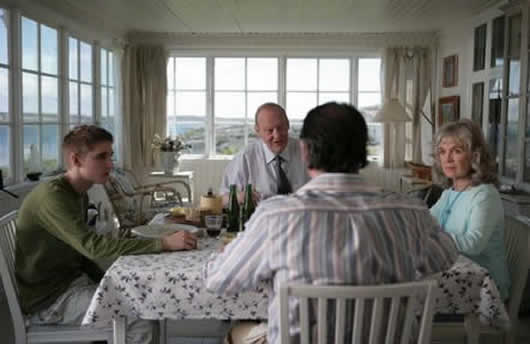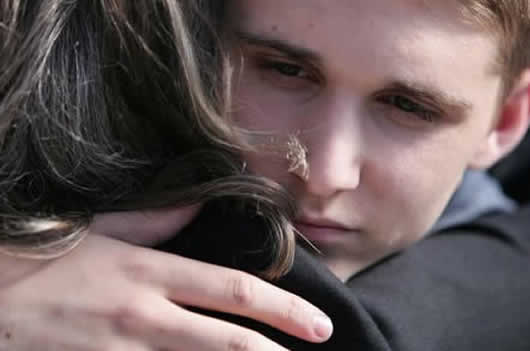 In Suddenly, when a tragic car accident claims the lives of a mother and her youngest son, the father, Lasse (Michael Nyqvist) and older brother Johan (Anastasios Soulis) are left to fight their grief alone. Lasse, in the grips of a suicidal depression, is urged to take Johan to their summerhouse on an island off Stockholm, where the two continue to avoid even mentioning their lost loved ones. Neighbors and grandparents are supportive in sometimes disruptive and sometimes intimate ways, and Johan gets genuine, loving care from a local young woman, Helena (Moa Gammel). It’s up to them to put down their own demons and deal with despair.
In Suddenly, when a tragic car accident claims the lives of a mother and her youngest son, the father, Lasse (Michael Nyqvist) and older brother Johan (Anastasios Soulis) are left to fight their grief alone. Lasse, in the grips of a suicidal depression, is urged to take Johan to their summerhouse on an island off Stockholm, where the two continue to avoid even mentioning their lost loved ones. Neighbors and grandparents are supportive in sometimes disruptive and sometimes intimate ways, and Johan gets genuine, loving care from a local young woman, Helena (Moa Gammel). It’s up to them to put down their own demons and deal with despair.
Michael Nyqvist plays the part of Lasse in Suddenly, and has enjoyed recent success in the critically acclaimed, The Girl with the Dragon Tattoo. Nyqvist is a Swedish actor and trained at the School of Drama in Malmö, He became well known for his role as police officer Banck in the first series of Beck movies made in 1997. The screening of Suddenly at the Scandinavian On Demand Film Festival provided a wonderful opportunity to speak with Michael Nyqvist about this film.
Bijan Tehrani: How did you encounter the idea for Suddenly?
Michael Nyqvist: We talked about what we have not yet seen in films; we talked about sorrow and how it feels to be in sorrow. We wondered if we could make a film about the difficulties in communication. That was the beginning—the story turned to be about a father and son and contains a hint of Bergman’s Cries and Whispers. So that was the beginning of making Suddenly.
BT: What do you think about the screenplay and was the finished film close to that?
MN: Yes, I liked it very much and I am proud of the film. It came out in the way that wanted it to look like.
 BT: This is a very personal film. How did you develop your connection with the subject of the film?
BT: This is a very personal film. How did you develop your connection with the subject of the film?
MN: If you are a grown up person and you have a family and kids, then you have gone through certain things and you have been around this subject and territory but you do not talk about it. I had my experience and the director had his experiences and we blended them in a way. What I brought into the scenes was the sorrow and the sadness, it is like chopping wood and you can see the characters crack like a branch. The humanism in the film is that you have to talk about it and communicate with it and I think the film is really about a father and son that time after time try to find a way to communicate with each other and finally they come together. But they go through rage.
BT: Why did the creative team pick the island location for Suddenly?
MN: We wanted to have a clash from the inside to the outside world. Suddenly is about how middle class facing crises. There is a sorrow in the family, then you say let’s re-paint the house! Let’s go on a great trip! A bourgeois kind of scape! We wanted to show that you don’t get help from the environment the way you expect. It was easier to have the story happen in a big city and in a torn down block and in a two bedroom flat with wallpapers hanging down and it would fit the tone of the film better, but we wanted to show a clash. With the director we were in agreement to show the story through a physical cinematic way. Our characters in the island summer house would have said: what a beautiful view and what a nice place, but none of these could change what has been happening inside them.
 BT: The contrast that exists between the tranquil location and stormy world of the characters helps create emotion and bridge the audience with the characters.
BT: The contrast that exists between the tranquil location and stormy world of the characters helps create emotion and bridge the audience with the characters.
MN: I remember that when we went out to the island, I said, “Christ how I can make this character with all of this angst in such a beautiful place on the Earth.” There were all of these beautiful people on the beach, and then I have to think about death and sorrow. There is a scene where the father in a small hut finds a life vest of his lost son and he cracks. We want people to get well and not to talk about their accidents, but you can’t run from it. May be this is a Scandinavian approach! As a Scandinavian I don’t meet a lot of happy actors—I think that says a lot about this profession.
BT: Did you try to find people close to you who have dealt with grief in order to research your role?
MN: I have to keep my fantasy and find the places inside of me. I began with the mission of finding this on my own. As an actor I don’t draw much from others’ experiences, I think about my own kids and how I would feel if they were gone. That is my way of working.
BT: How was this film different from the other projects that you were involved in?
MN: I have done a lot of these very emotional films that involve finding out about life and things like that. When we did The Girl with the Dragon Tattoo, it was more about life and how we lived, and the politics of life.
 BT: How was your interaction with the actor that played the boy?
BT: How was your interaction with the actor that played the boy?
MN: We did another film together three years and before Suddenly, where I was his father too. I think he was fourteen when we did that film and I was a very bad father in that film; I hit him and I hit his mom and was a little bit psychotic. For him, I must have seemed like a maniac when he was fourteen, yet I feel that I am a very kind person, so when we did this film I told him that this was revenge and he should go for it. He is a great guy and a great actor. We are very close because I got to know him better during making of Suddenly. We had a scene where I sit in a chair and he hits me, and it felt so good when he did that because I owed him that and I loved that he went for it.
BT: This relationship is very believable and it seems that you guys are father and son in real life.
MN: He calls me and asks about his career because he is younger than I am; I am like his extra father in some ways. He is very talented even though he did not go to any film schools; he is very, very good. When we worked in the first film called Home Sweet Home, we relied on taking responsibility for the film and also expressing the emotions, so that is what we tried to do in both of these films.
 BT: The great thing about your performance in this film is that we can see the sorrow in your eyes, how did you manage to do that?
BT: The great thing about your performance in this film is that we can see the sorrow in your eyes, how did you manage to do that?
MN: I had a technique: I always feel that when I see acting, I want to see the top of the iceberg, and 80% of it is below the water. You have to get in that state and be there twenty-four hours a day when you act; when you are drunk you try to act sober, when you are sad you try to act happy. I personally do not like acting when you have to paint it out with a big brush. What I love with the camera is that it finds you and it goes through the eyes and inside this actor or person that they are filming. It’s important not to try to do too much acting; one must rely on the eye of the camera as well.
BT: Do you have any new projects lined up?
MN: Yes, interesting things! I try to do things that interest me; subjects or characters or films that are about life and how we try to live. These films interest me greatly, and I also just wrapped Mission Impossible 4. The great thing about being an actor is that you can switch between different genres, and I want to lift all the hidden stones.
Suddenly is part of Eurocinema Scandinavian On Demand Film Festival

